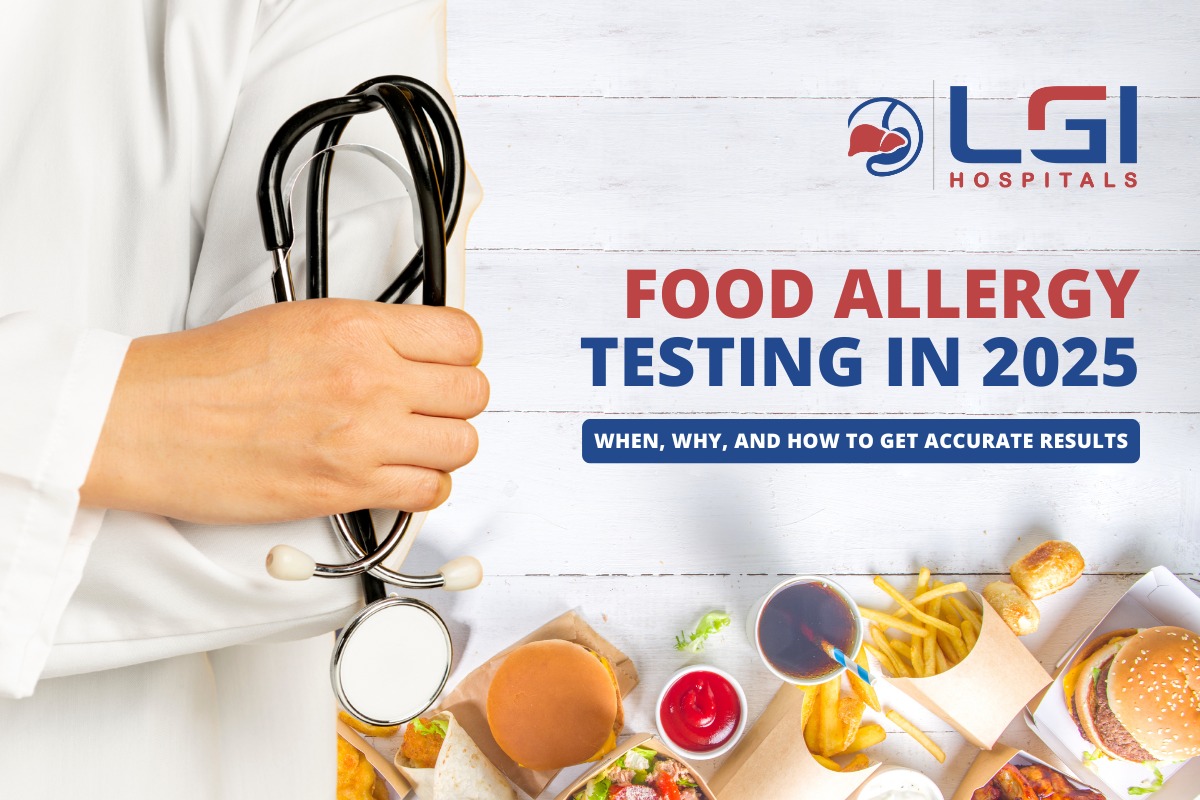Food allergies are increasingly common and can affect anyone, from children to adults. Early and accurate diagnosis of food allergies is crucial for safety and well-being especially as new foods and allergens emerge. This guide explains the latest in food allergy testing: when to consider a test, what options are available, and how to prepare for the process in 2025.
Quick Comparison Table: Main Types of Food Allergy Tests
| Test Type | How It Works | Best For | Speed | Pros | Limitations |
| Skin Prick Test | Allergen drops pricked on skin | Most common allergies | 15–30 min | Quick, sensitive, office-based | May cause mild discomfort |
| Blood (IgE) Test | Checks allergy antibodies in blood | Severe/systemic reactions | 1–3 days | No allergen exposure, lab-based | Can have false positives |
| Oral Food Challenge | Supervised eating of suspected food | Ambiguous or borderline cases | 2–4 hrs | Gold standard, direct observation | Needs medical supervision |
| Patch Test* | Allergen patch on back | Suspected delayed reactions | 1–3 days | Detects late/hard-to-pinpoint allergies | Not for immediate reactions |
*Patch testing is more common for skin allergies but may be used in specialized food reactions.
When Should You Get Food Allergy Testing?
- Frequent symptoms after eating: hives, swelling, vomiting, cramps, diarrhea, trouble breathing, anaphylaxis
- Family history of allergies or other allergic conditions (asthma, eczema, hay fever)
- Planning to introduce high-risk foods in infants or children (e.g., peanuts, tree nuts, shellfish)
- Unexplained digestive issues or chronic gut symptoms
- Before major dietary changes or international travel to new food regions
Pro tip: Always consult a certified allergist or immunologist before testing.
Step-by-Step: What to Expect During Testing
- Medical history & symptom log: Your doctor will ask about previous reactions, family history, and symptom timing.
- Physical exam: Assess for external signs of allergy and related conditions.
- Selecting the test: Based on your history and possible allergens, a doctor may recommend one or more tests.
- Performing the test:
- Skin prick: Quick, in-clinic; results in minutes.
- Blood test: Simple blood draw; results in a few days.
- Oral challenge: Conducted in a clinical setting under observation.
- Interpreting results: Your allergist will combine test results with your history to confirm or rule out allergies.
- Post-test care: If an allergy is confirmed, you’ll receive a personalized avoidance plan and emergency action instructions.
Innovations in Food Allergy Testing for 2025
- Component-Resolved Diagnostics (CRD):
Breaks down which specific proteins cause the reaction for a more precise diagnosis. - Multiplex microarray assays:
Test dozens of allergens at once from a single sample. - Home-based and AI-assisted testing:
Newer kits may allow preliminary testing at home but need professional follow-up for clear answers. - Genetic risk profiling:
Still experimental, but may soon help identify those at higher risk earlier.
Frequently Asked Questions: Food Allergy Testing
How accurate are food allergy tests?
Skin prick and oral challenges are highly sensitive; blood IgE tests can sometimes show “false positive” results. Diagnosis always combines tests and expert clinical review.
Can I test for allergies at home?
Some test kits are available, but their accuracy always confirms positives with a doctor.
What’s the difference between an allergy and an intolerance?
Food allergies trigger the immune system; intolerances do not. Testing for allergies helps clarify the cause of your symptoms.
Should my child get tested before trying nuts or shellfish?
If there is a strong family history or past reactions, testing before introduction is recommended.
How can I prepare for allergy testing?
Avoid antihistamines for 3–7 days before a skin test (as advised by your doctor). Share a detailed food and symptom diary.
Where can I get tested in India?
Most multispecialty hospitals, including LGI Hospitals, offer comprehensive allergy testing under specialist supervision.
Visual & Downloadable Resources
- Table: Comparison of test types with speeds, pros, and limitations.
- Flowchart: “Do I need allergy testing?” steps based on symptoms and history.
- Preparation checklist: For families to track food reactions and ready for their appointment.
LGI Hospitals Special Expertise
If you or your family experience unexplained gut symptoms, recurring digestive illnesses, or strong reactions to certain foods, consult LGI Hospitals’ gastroenterology and immunology teams for precise diagnosis and ongoing support.
LGI Hospitals, Nagpur offers:
- All leading types of allergy tests (skin, blood, oral challenge)
- Specialized pediatric and adult care
- Personalized dietary and avoidance guidance
- Cutting-edge technology for the most accurate results
Wrapping Up
Food allergy testing in 2025 is more accurate, accessible, and crucial than ever before. With guidance from expert clinicians and the right tests, you and your family can enjoy a safer, healthier approach to eating for life.
Act now:
If you have symptoms or concerns, contact LGI Hospitals to book your food allergy assessment and start your journey to better health.

